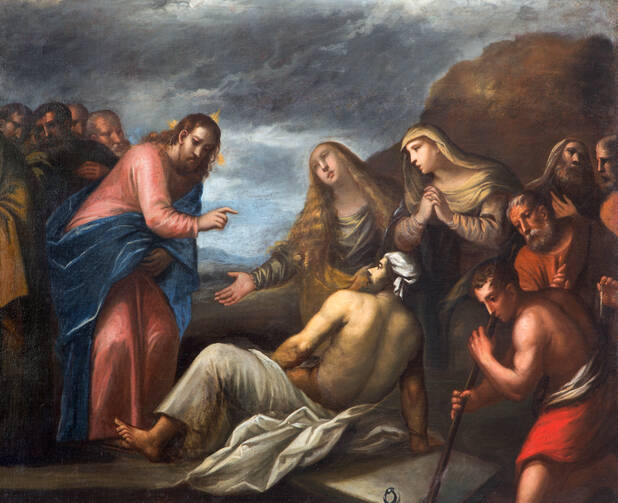Living like Lazarus
The preparation of the altar is a transitional moment in every mass, uniting the part of the mass called the Liturgy of the Word with the part called the Liturgy of the Eucharist. During this preparation, the priest mixes a splash of water into a chalice filled with wine and prays quietly, “By the mystery of this water and wine, may we come to share in the divinity of Christ, who humbled himself to share in our humanity.”
And Jesus raised his eyes and said, “Father, I thank you for hearing me. I know that you always hear me.” (Jn 11:41-42)
How do the signs in this Sunday’s Gospel passage speak to you?
How have you experienced the spiritual dying and rising of Lent thus far?
What are the implications to your life that Christ shares in your humanity?
In the raising of Lazarus, both the scene and the sign mark within the Gospel of John the transitional point that begins Jesus’ own passion narrative. In this Sunday's Gospel passage, Jesus decides to return to Bethany and raise Lazarus from the dead, an act with significant consequences for his mission. Although Christ shares his divinity with Lazarus, this same scene holds in tension Jesus’ human frailty and foreshadows his crucifixion. Like the prayer during the preparation of the altar at mass, he will share in our humanity.
The theology behind the powerful sign in today’s scene takes precedence. John the Evangelist has taken a healing story and crafted the narrative to highlight not the resuscitation of Lazarus, but the death and resurrection that Jesus will embrace. Thomas misunderstands the reason for going to Bethany to “awaken” Lazarus from his sleep. “Let us also go,” Thomas says to his companions, “to die with him” (Jn 11:16). Thomas heightens the tension already in air by referring to the Jerusalemites who are ready to stone Jesus when they see him (see Jn 10:31). While Thomas is committed to go on a suicide mission, Jesus is committed to help his disciples believe in the greater divine plan (see Jn 11:15).
Last week’s narrative of the healing of the man born blind reminded readers that the sign accomplished was meant “so that the works of God might be made visible” (Jn 9:3). In this Sunday’s Gospel, Jesus explains to Lazarus’s sister Martha, “Did I not tell you that if you believe you will see the glory of God?” (Jn 11:40). This question highlights the central paradox of John’s Gospel. The Son of Man will only reveal the “glory of God” when he is “lifted up” on the cross. This paradox is clear in the raising of Lazarus. The dramatic revelation of Jesus’ divine power leads directly into preparations for the coming Passover, an event that provides the setting for Jesus’ sacrifice on the cross.
The more one reads the story of the raising of Lazarus from the dead, the more one can gain insights on Jesus’ own death and resurrection. The narrative presents a twofold mystery. It invites one to live as a disciple, like Lazarus, with a share in the benefits of Christ’s divinity. But it also points to the greater mystery of Christ’s humanity and death, the saving victory that the church will celebrate in the coming weeks.








